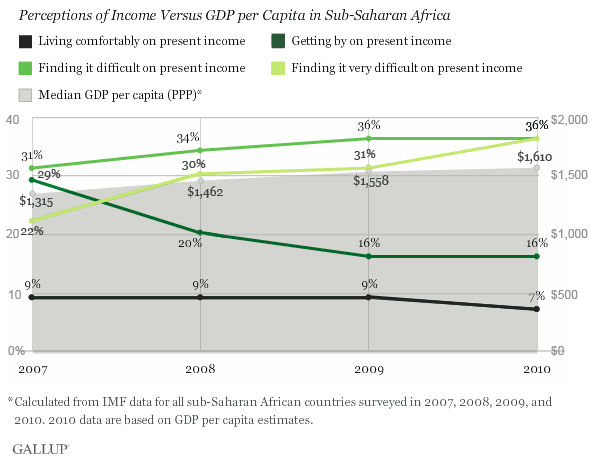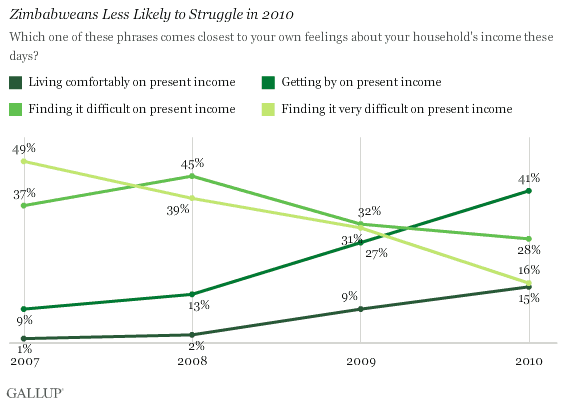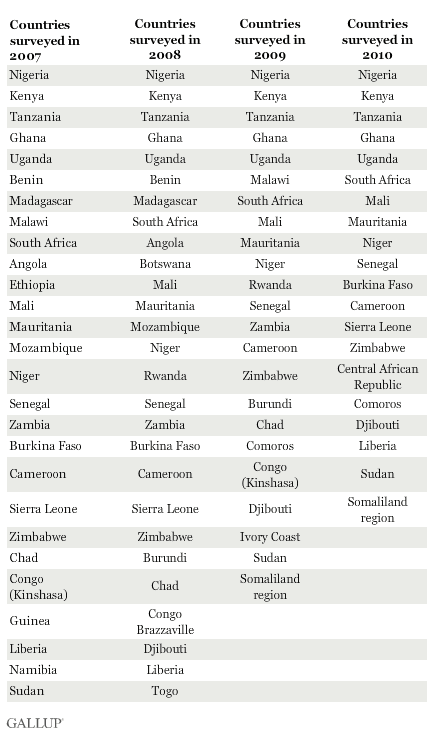WASHINGTON, D.C. -- Despite significant GDP growth in sub-Saharan Africa, Gallup surveys show more people are "finding it very difficult" to live on their present household income. The median percentage struggling this much rose from 22% in 2007 to 36% in 2010. The median of 16% who reported "getting by on present income" in 2010 is nearly half of what it was in 2007.

The number of countries Gallup surveyed each year varied, but the pattern was consistent. The percentages saying they were finding it difficult or very difficult to live on their present income increased, while those who said they were living comfortably or getting by fell. More movement took place among sub-Saharan Africa's "middle class" -- those who said they were getting by -- than among those who said they were living comfortably.
Across the sub-Saharan African countries Gallup surveyed, median GDP per capita (PPP) increased from $1,315 in 2007 to $1,610 in 2010. However, even in some of the countries with healthy economic growth, such as Ghana, the percentage finding it very difficult to live on present household income continued to increase. Ghanaians were three times more likely to report struggling this much in 2010 (34%) than they were in 2007 (11%).
Zimbabwe was the rare exception to the general pattern. Largely reflecting the end of record-high hyperinflation and the return to some normalcy, Zimbabweans in 2010 were three times less likely to say they were finding it very difficult to live on their present incomes (16%) than in 2007 when nearly half (49%) struggled this much. Zimbabweans are now among the most likely in sub-Saharan Africa to say they are getting by.

Implications
Gallup's data indicate that people in sub-Saharan Africa are finding it increasingly difficult to live on their present incomes even as their nations' economies grow, which suggests this growth is not trickling down to the average citizen, or if it is, it is not enough to make a difference. This does not bode well for people in the region if the global economic recovery sputters or if food and fuel prices rise. Further, the shift from "getting by" to "finding it difficult" likely means less disposable income and a potential decrease in spending that could hamper the sub-continent from reaching the World Bank's forecast growth of 5.3% in 2011 and 5.7% in 2012.
For individual country-level results by year, go to page 2.
For complete data sets or custom research from the more than 150 countries Gallup continually surveys, please contact SocialandEconomicAnalysis@gallup.com or call 202.715.3030.
Survey Methods
Results are based on face-to-face interviews with approximately 1,000 adults aged 15 and older, conducted each year referenced in the article. For results based on the total sample of national adults in all countries surveyed, one can say with 95% confidence that the maximum margin of sampling error is ±4.8 percentage points. In addition to sampling error, question wording and practical difficulties in conducting surveys can introduce error or bias into the findings of public opinion polls.


